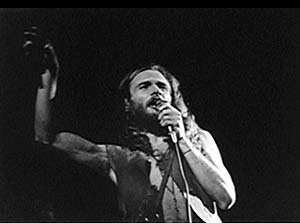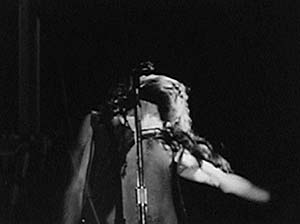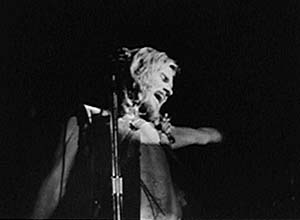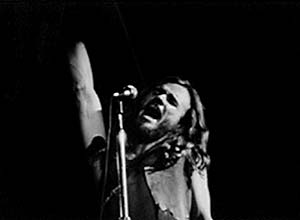|
|
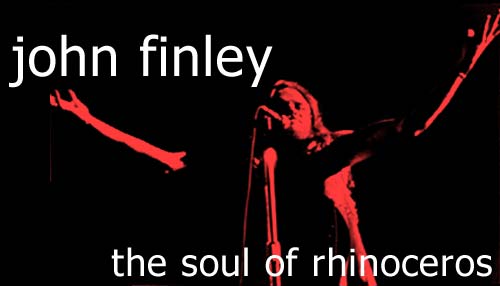
|
|
an interview
by Nick Warburton,
October 2002
|
John, you've got a fantastic soulful voice. When did you realise that you had a talent as singer and how did you get to join The Checkmates?
As far as assessing it as a talent, I didn't think about those things until I was a little older. When I was 15 or 16, I just knew I loved to sing. By the time I was 17 and had my first professional group, in an unconscious way I knew then that I had a talent. I remember that group before The Checkmates driving me home at the end of a weekend gig; I was in the car with the leader and lead guitarist of the group. I said, "Man, I want to do this forever" and the guy said, "Nah, you'll be just like us. This is a nice thing to do but you'll go to college... go to university, get a degree, and move into the real part of your life." And I said, "no, I want to do this all the time", and he just laughed. That was a moment when I separated myself.
Well, when I first started singing, my cousin Peter and Larry Leishman were trying to put together a band and I sang with them for a while, but that didn't last for very long. So, I ended up in a group called The Esquires, my first professional group. It will be forty years...forty years ago (laughs) this August that we started gigging. After about a year, that petered out, no pun intended; by then Peter was playing bass with The Checkmates. Actually, Larry was the first one to enter that group because before that it was Lee Jackson & The Checkmates. The guitar player, Al Dorsey either left or they dumped him and they got Leishman and it got more serious. He said, "I know, I'm going to get Peter in" and then the two of them said, "ha, we're going to get Finley in" (laughs). So I went down to a rehearsal in March '64. I'd already met Michael Fonfara in November '63 and we hit it off straight away.
I'd say Lee was an entertainer and a good dancer but he wasn't an emotional risk taker. He was singing those songs, but they wanted something "more emotional" in the group, so they got me to come down to a rehearsal and sing a song. So, I sang this blues, a James Brown song called, "Why Does Everything Have To Happen To Me?" and everyone in the group was really into it. Lee wasn't exactly thrilled about it...but after about a month, Lee started accepting me. I guess he figured I was going to be in and that was it. And he saw my value, that I could do things that he couldn't do and he knew he could do things that I couldn't do. That gave us a means of being on the same side as we began to support each other.
Do you have any special memories of those days in Toronto playing with The Checkmates?
It was a real blast. You know my experience wasn't just of Toronto but also New York where we played a lot. The scene was great... very alive, very creative... a lot of people making music and making money. And there was less judgement, less games... no corporate crap. It was just music.
I remember when we played Maple Leaf Gardens in Toronto... we did two shows with the Rolling Stones, one in April `65 and one in October that same year.(See picture below) The one in October....... we kind of stole the show. The place went nuts. We hit the stage and only had eight minutes. The Stones didn't give us any time but our close friend and supporter, Murray Campbell, who ran a club, The Devil's Den (our home), really fought for us. When I hit the stage, I could feel this big, huge, wet, blanket of humanity touch me, and as soon as it touched me, tears swelled in my eyes. We just opened up and it just flowed. It was amazing. Our limousine nearly got turned over by the fans. That was very special. There are photos of us on stage that night and it's easy to see the feeling with which we performed; James Brown saw some of those photos about a year later and just said, "You little boys got soul." And that was very special.
And there were other things... the opening of the City Hall...there were 60,000 people and we felt like kings (laughs); it was special, you know. I remember at one point the place going nuts. The Mayor of Toronto and Bobby Curtola (who was a kind of Frankie Avalon-type candidate) were both trying to stop us from playing. Curtola tried to grab Michael's hands from the organ and Michael just slapped him... and Mayor Philip Givens tried to grab Jeff's drum sticks and Jeff knocked him across the knuckles with the drum sticks. And we just continued to play. They hated us, you know, the new wave is always hated. Afterwards as we were going down to our dressing room, a bunch of girls came screaming and Bobby Curtola thought they were going after him. He saw them and he looked at them, so they would recognise him and then he started to run. But none of them ran after him, they ran after us...we had to get help because they were tearing our clothes off.
Also in `65, there was the big article on Saturday, July 1st, about us having $100,000. worth of contracts in the US; it came out on the front page of the entertainment section of the Toronto Star...that was very special. And Lee had gotten back from a trip to New York with Cecil Farrell to visit Leo Pillot and they sat and had breakfast in Ed Sullivan's apartment in the Del Monaco Hotel and that was very special...
On my last trip to Toronto, Jeff Cutler gave me a video of the documentary The Checkmates did for CBC, which I believe had something to do with the Cannes Film Festival. What's the story behind that?
I don't know much about Cannes, but I do remember... that CBC wanted to do a documentary on us... and CBC was really into music...and that ... they spent a couple of weeks with us. It was a wonderful experience.... and the night they aired it on TV (a Sunday night), we had a big special in the Avenue Road Club, where the Devil's Den was (in Yorkville, Toronto's Greenwich Village at that time), which was our home then. Upstairs (the main floor) had the big Ballroom; the special was held there. We did a concert set then they showed it on TV screens throughout the ballroom and the front lounge as it was publicly broadcasted throughout Canada. It was a big deal.
What's the story behind The Checkmates song for the Batman TV series? I gather the track was recorded live at the Peppermint Lounge in New York for use in the series?
That opportunity was presented to us by Leo Pillot who was VP of Publicity in ABC TV's Entertainment Dept. and, yes, it was recorded on remote at the Peppermint Lounge in December `65; we were currently performing there 6 nights a week from 8pm `til 4am!!! I believe Duke Edwards, our music papa at the time, wrote it. It wasn't a masterpiece but it did the job. We subsequently performed it LIVE at a Madison Square Gardens show ( I don't remember who was on the show) but never did it again once we finished our 4 weeks at the Lounge.
How did Paul Rothchild get involved?
Paul came to see us play in the fall of '65. He came to the Avenue Road club, the Devil's Den and told us he wanted to bring us to Elektra Records but we had a lot of labels after us at that point. Elektra was a small label then and we kind of went 'errr.....hmmm'. And I remember he gave me two albums to listen to of his work and it was Paul Butterfield's Blues Band's first two albums. He remained a fan and used to come and see us and other groups, like Luke & The Apostles and, of course, Levon & the Hawks. He was scouting and producing, a very hands-on guy. We maintained a friendship with him.
When The Checkmates broke up in Philadelphia in October [1967], Peter went to New York and I stayed in Philly for a while and then returned to Toronto. In New York, Peter was playing at the Scene with David Clayton-Thomas & The Phoenix; Rothchild approached him and said, "I'm putting together a supergroup and I'd like you to get involved"... and Peter said, "Oh great, what about my cousin?". He said, 'who's your cousin?" and Peter said, "John Finley". Paul said, "Oh yeah, John; get John out there..." I got a message from Peter or possibly someone in LA, to call Paul collect and I remember phoning him collect at (213) 656-1656 (or something like that ) from a phone booth in Toronto on Avenue Road; I'll never forget it. We talked awhile and then he said, "Come on out"... and he sent me a plane ticket.
What were your thoughts during the auditions for Rhinoceros?
It was scary as hell. It was like football tryouts. I had never been in anything like that; it was like a cattle call. I guess there had been one [meeting] before the one I was involved in. But the one I was first involved in was on December 1; I got into town the night of November 30 and the next day we had a meeting at the house that Barry Friedman and Paul shared up on Ridpath in Laurel Canyon. There were about 20 of us there. There were people from the West Coast, people from... Alan (Gerber) from Chicago, people from Omaha, Nebraska... people from all over the place. I was totally intimidated and everybody was a songwriter and I wasn't a songwriter. I had written a little, but I was a singer and I was the best singer there... and they asked me to play something and all I could do was go to the piano and sing the blues. They didn't really want to hear that but Paul knew I had something going on; he knew it from having seen me in The Checkmates; and he knew that nobody else could deliver that kind of thing.
So that was how that happened. Some people were eliminated... some people were sent home and some people quit.
Jon & Lee & The Checkmates supporting the Stones in Toronto, 1965.
(from Left: Jon, Lee, Larry, Peter) |
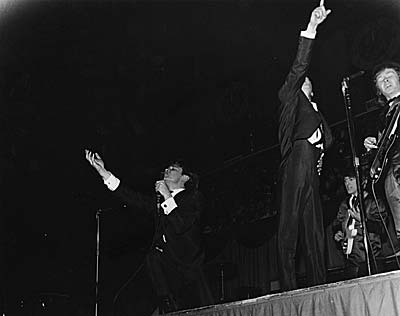 |
You say that you weren't really a songwriter but you did write some tunes on the first album. Were they songs you had written during The Checkmates or new compositions?
All of my material on the first album was brand new stuff. In fact, we recorded most of the album (eight... well, there were around fifteen things, not everything was used) in June [1968] then recorded the final two songs for the album in July. There was a thing in 7/4 time that we never used. It was a very interesting song called... (sings) 'Once Again'. I'd like to see that released and also one called 'Storm' that Alan Gerber wrote. You know, his writing had a very modal, slightly classical, folkish thing about it. It was really unique. He never ended up doing that because they [Elektra] weren't into it. His thing was very special, very Alan, like nobody else. There was another one called 'Pain In The Wind', which I used to say was 'about the pain that when your mind turns to Swiss cheese, is the pain of the cold air blowing through the holes in your mind'.
But back to the songs: In that period when we got together, writing that first album, before the album was recorded, Danny and I had written 'Somewhere', which wasn't used until the third album; it was a little different than it was on the third album. It was commercialised on the third album and all this stupid rain and thunder shit was put in. It was this very interesting introspection... you know I wrote it with a real... instead of writing a song song, it was real kind of unconscious, automatic writing kind of stream of consciousness. And it was just a pure thing.
'That Time of Year' was my big performance on that album as far as soulfulness I guess. Then we had two outside tunes from a Little Richard album, 'You're My Girl' and 'I Need Love'. 'I've Been There', I think Alan and I wrote that. Now 'I Will Serenade You' was written in between that first batch and the second little bit and it was recorded in the last session. The other thing I was involved in, I wrote with Danny, it was 'The Same Old Way', that real slow thing that comes before 'Apricot Brandy'. Then with Danny I wrote 'Belbuekus'.
I believe there's an interesting story behind 'Belbuekus'?
'Belbuekus' was...Danny had this instrumental and it was so bombastic... and he used to play it all by himself... he was so full musically, he could play it all by himself because he was so adept, so talented. And I just started to write some lyrics in the empty places. People used to ask, 'What's Belbuekus?' It's an old joke that goes back to The Checkmates. We got it from this band called The Uncalled For, who came up to Toronto from the US; they had this term: 'Belbuekus'. We ended up naming our roadie 'Belbuekus'... and what 'Belbuekus' was...was defined as 'the sweat and grease that drips down off your balls, down your legs and burns holes in the tops of your socks'. So, if you review the lyric of 'Belbuekus', that's what it talks about.
'I Will Serenade You' is perhaps your best known song; did the song come to you quickly?
The lyric did. It just kind of pooped out. I was sitting at the piano in our house in Laurel Canyon - the one I shared with Michael and Alan Gerber before Michael moved out to live with Danny and Jerry Penrod. I was sitting at the piano fooling around one day and I was thinking about the lyric I'd written and the music wasn't doing it. And...and then for some reason the title, Serenade started me thinking about the King Curtis instrumental 'Soul Serenade' (sings) and then I went from there and made some other changes and made the tune. I still do it live when I go up to Toronto. It's a nice way to connect with an audience.
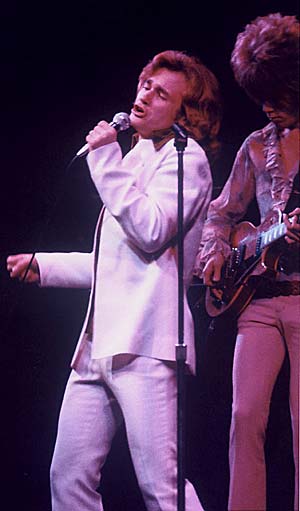 |
| John and Danny photographed at the Fillmore East by Raymond Ross. Courtesy Randy Pratt (as above) |
The group didn't sell a lot of records but from the response to the visitor's page on the website, the band seems to have made a huge impression live. Did you feel that at the time?
I don't know if I had a feeling about it one way or the other. I knew that we were a good band...and I knew that I was intense (laughs). You see, our appeal ran very deep but not very wide. So we made a deep impression but not to a lot of people. By that I mean irrespective of the mass.
Looking back, what was your fondest memory and biggest regret?
I think one of my fondest memories was of recording the first album. It was such a joy to work with Paul (Rothchild). I trusted him completely. He was so talented, so intelligent, so on top of his craft but most of the guys had different feelings. They didn't trust him. Paul could be very intolerant and had a big ego. That didn't bother me because our friendship and relationship was based on mutual respect. There was no ego involved, no competition. I just thought he was great and he gave me the feeling that he felt the same about me. But it wasn't that way with all the guys and him. Paul would say the most important thing about any record was the singer and the song; they didn't really like to hear that. He could be brutal sometimes. But I really feel that with Paul... you would give to Paul and he would give to you.
The other thing was all the pretty women (laughs) and some of the gigs. The Checkmates was a more spiritual experience for me musically, but there were some very spiritual moments on stage with Rhinoceros. When you feel that you are on automatic, just a spectator and it's just coming right through you. You're in 'the zone' as athletes would call it. It's very special. Oh, then I remember in Philadelphia we played a gig and it was one of those gigs where I hated myself after the show, even though people would come up and compliment me. The more they did the more I hated myself (laughs)... and these two beautiful women came up to me afterwards and said (puts on sexy woman's voice): 'Oh, you look depressed, why don't you come home with us and we're going to take good care of you'. That was great (laughs). That was the perks.
The biggest regret? Here I'm going to be very subjective and relate back to my feelings at that time; I hope no one is too offended. There were three big errors, three big things, poor decisions made and I knew that they were all wrong. I stood up against them as long as I could but I didn't have enough confidence or insight to really say, 'screw you guys... and I am going by what's right and if you guys don't go with me, then I go alone'. One was leaving the West Coast to go to the East Coast. Now that's no disrespect to the East Coast, but we were a West Coast band, we were started there and the label was there... what nurtured us was there.
Two: firing Paul Rothchild. The guys wanted him out but were all afraid to tell him so I had to tell him at a pre-production meeting...and couldn't tell him I voted against it. I told him afterwards. Leaving the West Coast was not a good thing, but I thought this was the single fatal error and my regret is that I didn't stand up. Now in a sense its not a regret because how can you regret your life? If I regret my life, I resent my life and I don't. Everything leads to things you don't know where it's going. But it was a fatal, fatal error. I felt for myself, my regret was that I didn't have the confidence...maybe the maturity...you know? The sense of...if I knew anything I know now, I would have treated it so much differently. Rhinoceros wasn't a success, it was an opportunity and none of us knew how to take care of it. The third fatal thing was when we left the label and Jac Holzman implored us to stay, do a fourth album and "see what happens". So you know, strike three and you're out.

Why don't you think Rhinoceros was as successful as Elektra anticipated?
I think a number of things. One, I think the label promoted us improperly. I think they hyped us too much. I think it turned a lot of the street press, like The Village Voice, against us. But they had invested a lot of money; I don't fault them for their effort, they treated us very well. I just think there were some things done wrong. They did a lot of things right. Also, some of the reason was the band, we were inconsistent live.
...you had a lot of changes in personnel...
That happened too and that was because the band was unstable inside... because we didn't come together on our own. We were put together and without the maturity to deal with it, so if you take away the forces that put it together like Paul Rothchild, you take away the forces that keep it together, so those were the two big reasons. The biggest one was they [Elektra] made an incredible hype and we didn't live up to it... go to New York on a hype and New York will eat you alive. We went to New York on the big hype and disaster!. You could do it in L.A but not in New York. And the other thing was our inconsistency. Even if we had been hyped...and we went to New York and we had our shit tight together, consistent, awesome every time then New York would have said: 'Oh fuck'. And we were a brilliant group at times, but "at times" just didn't cut it.
Any favourite line up?
The original band; oh yes, the original membership was the best. Even though some of the later people were wonderful, the original configuration was what Rhino was really meant to be. The more it changed from that, the more it was another band.
Any particularly memorable shows during this time?
Oh yes, there was an Electric Circus in New York and one was opened in Toronto. The people that went to the one in Toronto were like, 'how hip can we be? We're so cool', and they go there all dressed up and everything. And they wouldn't react to the music...they were cold. So we were trying to get to them all night Part of the way through the second show, I had just had enough and I said: "I want to thank you people and I want to compliment you. You aren't just easy dime store folks. You people are truly discriminating listeners and you've got so much class so I'd like to send this next piece out to you". And I put the microphone down to my ass and farted...and of course a third of the place left, walked out the door. A lot of people were shocked and Frank Zappa cracked up...cracked up. He was in the audience. That was one of my proudest moments (laughs).
Did you get a lot of compliments from other musicians during that period?
Oh yeah, musicians knew how good the band was; and they still remember us! I run into people, fellow musicians. It always shocks me.

I heard that during the rehearsal stage, Jac Holzman dropped by to see how the project was going. What's the story about that?
It probably happened between December 5th and 10th when we were rehearsing in the loft at the music store on Santa Monica Blvd. (Music City?). Jac came up with Paul Rothchild, and maybe Barry Freidman, to see how things were progressing. Alan Gerber played and sang some songs, newly arrived Danny Weis played a solo or two and then Paul asked me to sing something. Well....I was as nervous as a Canadian musician going through US Immigration. I'd been working on a song of Alan's called "That Time Of The Year" and so Paul said "Do it." I choked and almost croaked and I mean I could hardly sing! When I finished, I knew I'd blown it and expected the immediate boot but Jac just smiled and said something nice and gentle (a true gentleman) though I knew Paul was disappointed.
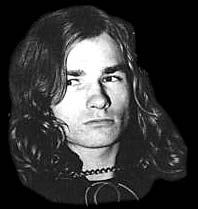
Jac got up and left. Paul then said something like, "Hey John, why don't you try it again without Jac here; I know what you can do." Alan plays the intro and then I sing. At that moment, all the tension and fear bursts like a dam and I sing the song with my heart and guts torn open and my eyes wide shut. By the end, I'm in tears and I open my eyes to see Paul in tears and Jac right there in front of me! What a moment! My memory is a little confused about this following: At this point, Jac was either beaming with a big smile, in tears also or a combination of both. Now he was happy with the progress and I had saved my bacon......haha! That was the defining moment for my involvement in the project.
I recently discovered that Rhinoceros appeared in the film "The Day The Music Died", which came out in 1970. What do you remember about this film?
I'm not sure. If that was the film at the Randall's Island Music Festival in the summer of `70, I think Sly was on that show as well as NRBQ. I seem to remember the JDL (Jewish Defense League) was involved and that there might have been some sort of violent altercation. I remember having a good time, it being a warm summer day, being bare-chested except for a suede leather vest, Duke insisting that he wasn't 40 years old and the gig going well. I was really very apolitical though I didn't let on about that; in those times, it was hip to be fervent, radicalized, polarized, etc.
About 10-15 years ago, a film/video maker named David Jove showed me some footage from it that he was using for something he was creating. I don't know what happened to it. I seem to remember something else more recently that I received contracts on but it too seemed to disappear into the dust.
There was another film we were in though; I wish I could recall the name of it. It was done in the mountains outside of Taos, New Mexico. Wavy Gravy was supplying the transportation from the airport up to the mountains, maybe onto an Indian reservation. Our part in it depicted an outdoor music festival, there was a lot of acid and we performed "Somewhere" from the "Better Times" LP. I think I'm on a dead-end road with this one. Haha.

Presumably Rhinoceros must have done some TV work to promote singles. Do you remember any particular shows?
Ah! One particular show in Wilmington, Delaware or was it Baltimore, MD? Well, anyway, it was a Sunday morning (ugh) taping, nice and early (double ugh!) and we were set to do "When You Say You're Sorry". (Incidentally, it was at this point that I realized that we and myself were finally getting comfortable doing lip-sync work, which this was.) I'm spacing out on you Nick; sorry. The significance is that we met a brand new Soul group, still unknown, called ...The O'Jays! And there were four (4) of them! I remember that distinctly. I wonder whatever happened to... File under "I'll never forget what's his name."
Can you tell us more about the demos that you recorded with Todd Rundgren? When would these have been made and which Rhinoceros line-up appears on the tracks?
Hmmm.....that's a good one, fuzzy memory.......I'll try.
I believe we did it at his studio up in Woodstock, NY in the fall of 1970. Some of the song titles: "With An Open Heart", "Angel Bird Has Flown", "Somebody Just Came Walkin'" and "Sail On". I've never heard them. I remember we also did a Thanksgiving Day gig up around there and that we performed those songs that night. I remember playing Fender Rhodes piano on "Angel Bird". The personal included Danny Weis (not sure here; he may have already left the group), Larry Leishman, Peter Hodgson, Michael Fonfara and Richard Crooks on drums.
I gather you did some studio demos during the '80s and '90s - original songs like 'Stay' and 'Listen To Your Heart'. Were you planning to release these yourself or did you have other artists in mind?
Gee, I don't know. I just do them and love the process and hope to make something of them one way or another. "Listen To Your Heart" was originally done as an artist demo for my old friend, Mel Posner, at ELEKTRA; we became friends while I was in Rhino and he was VP of Marketing there. There were three songs and that one has hung in. "Stay" was one of a group of songs I wrote with Kenny Lewis in the early 90's; our most noteworthy one was "Why Can't I Fall In Love", recorded by Ivan Neville for the film "Pump Up The Volume" in `91. That song was written for the film by request.....you know, an actual project.
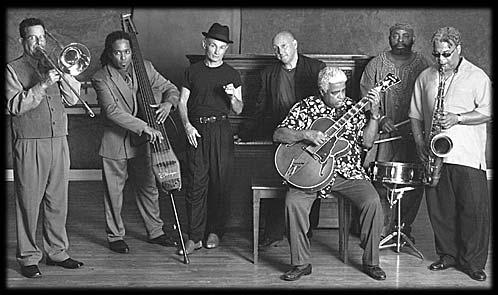 |
SOULBOP! 2001, with John (centre in hat) and Phil Upchurch (seated) |
You did some recordings during 1999 for the Finley-Ironstone project. What's happened to these songs?
The project (or band) got named "SOULBOP!" There were 5 songs; three were original arrangements of "Blue Skies", "Open The Door To Your Heart" and "In The Midnight Hour" and two were originals: "The Doctor's In The House" and "I'm Gonna Getcha". "Getcha" is a kinda of lightly jazz flavoured R&B piece while "Doctor" is more bluesy. "Blue Skies" is the old old! Irving Berlin standard reharmonized into a more contemporary jazz R&B setting; "Open The Door" is a redo of the classic soul record by Darrel Banks in `66; finally, "Midnite Hour" (as we've retitled it) is so different from the Wilson Picket original that if not for the lyric, you wouldn't have a clue what it was. Funny thing about the lyric....I always considered it well written if unremarkable but when put in this musical setting, its truly dark nature is revealed; I mean it's almost menacing at times, definitely kinky undertones.
Anyway, these 5 are really the first half of our CD. We're nearing completion of the 2nd half as of this Thanksgiving (US: Nov. 28th). The second 5 will round out the picture and are more jazz flavored than the first batch. Also, our instrumentation is more set now, with sax and trombone as a consistent part of the band sound and identity. The lineup includes "They Can't Take That Away From Me" and "It Ain't Necessarily So" (both George Gershwin tunes), `Round Midnight" (Thelonious Monk classic) as well as two more originals.
Soulbop at the Baked Potato, August 2003
Photo Courtesy of Michael Tweed ©
www.tweedphoto.com |
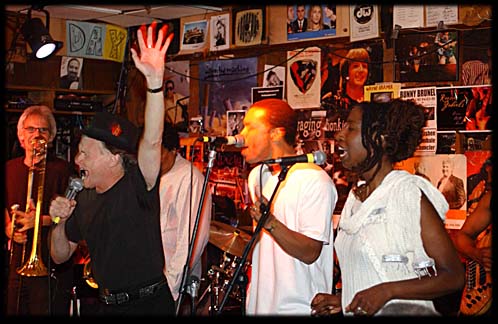 |
We'll be looking for the right people to involve in SOULBOP! in the New Year, label and management, etc. Musically, I really feel as though this is a culmination of so much of my life's music experience, the meeting of two very important lifestreams: jazz and soul. My partner, Danny Ironstone, and I really hope others will find and share in the joy we feel in this music.
Well, at least it keeps me off the streets.
Guess that's about it, Nick. Many thanks to you and Mike for your interest in The Checkmates, Rhinoceros and SOULBOP! as well as yours truly. The website continues to amaze me; I can't imagine you guys not in my life.
Copyright © Nicholas Warburton/John Finley. October 2002.

|





